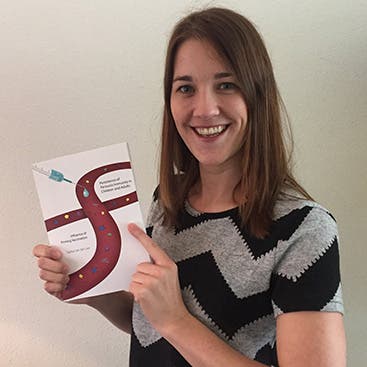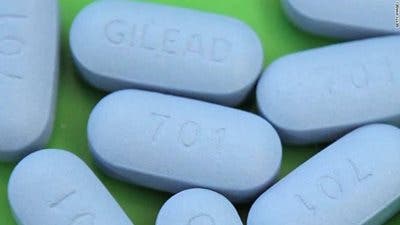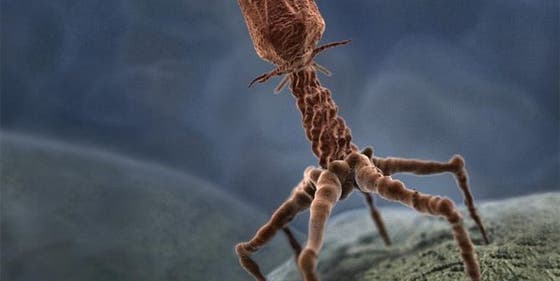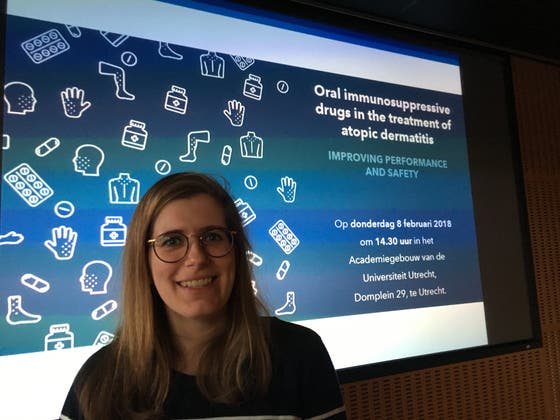Infection and Immunity nieuws
Apr 30: UMC Utrecht participates in a study on SCID admission in heel prick screening

Can the heel prick in newborns also be screened for “severe combined immunodeficiency” (SCID), a severe immune disorder? This question is being studied in the so-called SONNET study at the UMC Utrecht in collaboration with LUMC (study lead) and RIVM.
Read moreApr 26: Carla Bruijnzeel-Koomen appointed Knight in the Order of the Dutch Lion

Prof. dr. Carla Bruijnzeel-Koomen, recently professor emeritus of dermatology, has been named Knight in the Order of the Dutch Lion. Mayor of Zanen of Utrecht presented the corresponding award at the Stadsschouwburg on April 26.
Read moreApr 12: Difficult atopic dermatitis patients can now also be treated well

Patients with severe atopic dermatitis, in whom the usual treatments do not work well or give too many side effects, can now be treated well with dupilumab, the first medicine that was developed specifically for this disease. Its effectiveness and safety have now been investigated in this group, in which the National Expertise Center for Atopic Dermatitis in the University Medical Center Utrecht has played a key role.
Read moreApr 5: Better defense against whooping cough with extra vaccination for teenagers and young adults

Whooping cough is a very contagious disease that can go seriously. Whooping cough is unfortunately becoming more and more common, also among teenagers and young adults. To protect them better, it may be useful to give an extra vaccination.
Read moreMar 29: New protein discovered that increases survival of bacterium Staphylococcus aureus

The bacterium Staphylococcus aureus produces the so-called SPIN protein that inhibits the enzyme myeloperoxidase. Because white blood cells can not destroy this bacterium, it can escape the immune system and cause infection. The newly discovered SPIN protein is described in the PhD thesis by Nienke de Jong, who will be awarded a PhD in Utrecht on March 29.
Read moreMar 2: New leads identified for developing uveitis in juvenile idiopathic arthritis

Genetic factors play a role in the risk for patients with juvenile idiopathic arthritis (JIA) to develop uveitis (a severe inflammation of the eye). This offers possibilities to select exactly those patients for frequent checks by the ophthalmologist in whom the risk is highest. This is one of the conclusions in the thesis of Anne-Mieke Haasnoot, which was awarded a PhD in Utrecht on Thursday, March 1.
Read moreMar 1: Utrecht starts pilot with HIV prevention pill PrEP

A pilot with the HIV prevention pill PrEP is starting in Utrecht. People who want to protect themselves against HIV (human immunodeficiency virus) and therefore want to use PrEP can be tested and medically assisted by UMC Utrecht. The municipality of Utrecht finances the project.
Read moreFeb 23: Phage therapy for when antibiotics stop working?

On 22 February, UMC Utrecht (in collaboration with TU Delft and the Netherlands Center for One Health) organized an international symposium for the first time in the Netherlands on the possibilities of phage therapy in the treatment of patients with infections due to resistant bacteria. Experts from the Netherlands and abroad presented their experiences in research and therapy in relation to bacteriophages in Utrecht.
Read moreFeb 21: TOP grant from ZonMw for follow-up research into the relationship between livestock farming

Residents of cattle farms have an increased risk of pneumonia. In rural areas, the presence of livestock farming accounts for up to 20 percent of all cases of pneumonia, but pathogens are unknown. Researchers from and UMC Utrecht, Utrecht University (Institute for Risk Assessment Sciences) and Erasmus University Rotterdam will jointly investigate possible causes. ZonMw granted the project proposal a TOP grant of 675,000 euros.
Read moreFeb 9: Treatment of serious atopic dermatitis mapped

Yesterday, Floor Garritsen received her PhD on the outcomes of her large-scale research, in which the use in the daily practice of oral immunosuppressant drugs in patients with severe and/or difficult to treat atopic dermatitis was mapped.
Read more